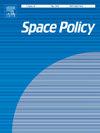Safeguarding European space sovereignty—Recommendations for operational climate services to support resilience
IF 1.9
4区 社会学
Q2 INTERNATIONAL RELATIONS
引用次数: 0
Abstract
Europe’s space sector needs operational climate services to remain safe. Operational climate services ought to include both the regular production of high-resolution climate change projections, similar to operational weather forecasts, as well as the derivation of space-sector-specific climate impact indices. Climate projections are mainly executed within the scientific realm, while climate indices are oftentimes developed in short-lived projects. This leaves climate risk assessments of critical European space infrastructure, including the Guiana Space Center in Kourou, French Guiana, reliant on the foresight of climate scientists. The absence of comprehensive and periodic climate risk assessments for this sector could compromise Europe’s capability to launch and replenish its earth observation, navigation, and telecommunication satellites in the event of damage or destruction. The consequences can be significant, with potential impacts on European security, defence, and economic stability. In this paper we advocate for increased collaboration between climate service scientists and strategic operational managers of European space infrastructure to ensure that relevant and usable climate indices are developed through a co-design process. Climate services can help prioritize concerns and manage resources to build resilience in the space sector. Ultimately, climate-related hazards should be considered a space threat by the European Union.
维护欧洲空间主权——关于支持复原力的业务气候服务的建议
欧洲航天部门需要可操作的气候服务以保持安全。业务气候服务应包括定期编制高分辨率气候变化预测(类似于业务天气预报),以及推导特定于空间部门的气候影响指数。气候预估主要在科学领域内进行,而气候指数通常是在短期项目中制定的。这使得对欧洲关键空间基础设施(包括法属圭亚那库鲁的圭亚那空间中心)的气候风险评估依赖于气候科学家的远见。该部门缺乏全面和定期的气候风险评估,可能会损害欧洲在发生损坏或破坏时发射和补充其地球观测、导航和电信卫星的能力。后果可能非常严重,对欧洲的安全、防务和经济稳定都有潜在影响。在本文中,我们提倡加强气候服务科学家和欧洲空间基础设施战略运营经理之间的合作,以确保通过共同设计过程开发相关和可用的气候指数。气候服务可以帮助确定关切事项的优先次序并管理资源,以增强空间部门的复原力。最终,与气候相关的危害应被欧盟视为一种空间威胁。
本文章由计算机程序翻译,如有差异,请以英文原文为准。
求助全文
约1分钟内获得全文
求助全文
来源期刊

Space Policy
Multiple-
CiteScore
3.40
自引率
36.40%
发文量
40
期刊介绍:
Space Policy is an international, interdisciplinary journal which draws on the fields of international relations, economics, history, aerospace studies, security studies, development studies, political science and ethics to provide discussion and analysis of space activities in their political, economic, industrial, legal, cultural and social contexts. Alongside full-length papers, which are subject to a double-blind peer review system, the journal publishes opinion pieces, case studies and short reports and, in so doing, it aims to provide a forum for the exchange of ideas and opinions and a means by which authors can alert policy makers and international organizations to their views. Space Policy is also a journal of record, reproducing, in whole or part, official documents such as treaties, space agency plans or government reports relevant to the space community. Views expressed in the journal are not necessarily those of the editors or members of the editorial board.
 求助内容:
求助内容: 应助结果提醒方式:
应助结果提醒方式:


